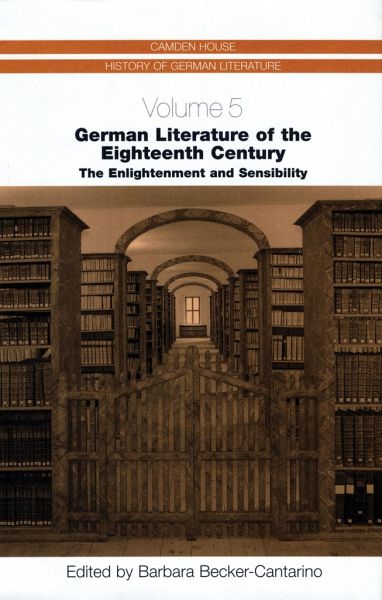Nicht lieferbar

German Literature of the Eighteenth Century
The Enlightenment and Sensibility
Herausgeber: Becker-Cantarino, Barbara
Versandkostenfrei!
Nicht lieferbar
New essays tracing the 18th-century literary revival in German-speaking lands and the cultural developments that accompanied it. The Enlightenment was based on the use of reason, common sense, and "natural law," and was paralleled by an emphasis on feelings and the emotions in religious, especially Pietist circles. Progressive thinkers in England, France, and later in Germany began to assail the absolutism of the state and the orthodoxy of the Church; in Germany the line led from Leibniz, Thomasius, and Wolff to Lessing and Kant, and eventually to the rise of an educated upper middle class. Li...
New essays tracing the 18th-century literary revival in German-speaking lands and the cultural developments that accompanied it. The Enlightenment was based on the use of reason, common sense, and "natural law," and was paralleled by an emphasis on feelings and the emotions in religious, especially Pietist circles. Progressive thinkers in England, France, and later in Germany began to assail the absolutism of the state and the orthodoxy of the Church; in Germany the line led from Leibniz, Thomasius, and Wolff to Lessing and Kant, and eventually to the rise of an educated upper middle class. Literary developments encompassed the emergence of a national theater, literature, and a common literary language. This became possible in part because of advances in literacy and education, especially among bourgeois women, and the reorganization of book production and the book market. This major new reference work provides a fresh look at the major literary figures, works, and cultural developments from around 1700 up to the late Enlightenment.They trace the 18th-century literary revival in German-speaking countries: from occasional and learned literature under the influence of French Neoclassicism to the establishment of a new German drama, religious epic and secular poetry, and the sentimentalist novel of self-fashioning. The volume includes the new, stimulating works of women, a chapter on music and literature, chapters on literary developments in Switzerland and in Austria, and a chapter onreactions to the Enlightenment from the 19th century to the present. The recent revaluing of cultural and social phenomena affecting literary texts informs the presentations in the individual chapters and allows for the inclusionof hitherto neglected but important texts such as essays, travelogues, philosophical texts, and letters. Contributors: Kai Hammermeister, Katherine Goodman, Helga Brandes, Rosmarie Zeller, Kevin Hilliard, Francis Lamport, Sarah Colvin, Anna Richards, Franz M. Eybl, W. Daniel Wilson, Robert Holub. Barbara Becker-Cantarino is Research Professor in German at the Ohio State University.



